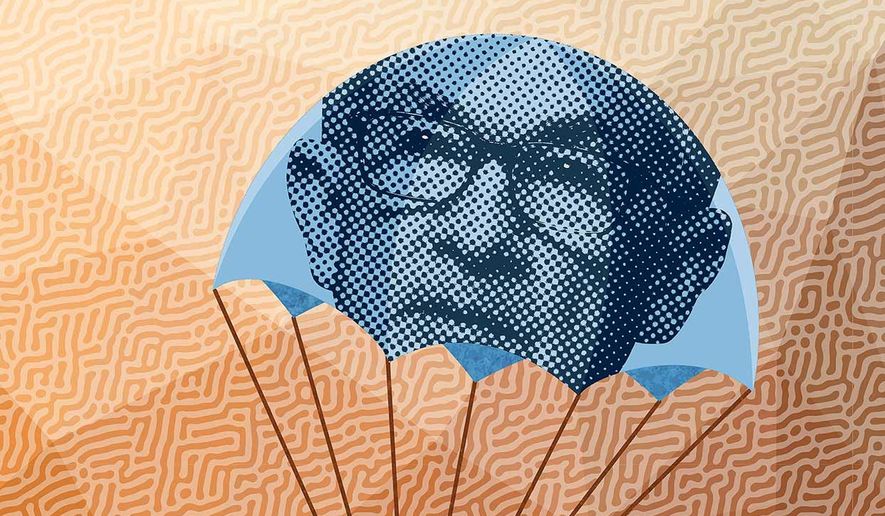OPINION:
The economy is slowing, and inflation continues to impose unrelenting pain on working- and middle-class Americans.
Botched monetary policies and too much statism are smothering the market economy’s natural mechanisms to accommodate changes in social, technological and geo-political conditions, as the Federal Reserve needlessly obsesses about a soft landing vs. a recession.
National Bureau of Economic Research defines a recession as “a significant decline in economic activity,” and it considers the depth, diffusion and duration of the contraction.
To date recessions, it considers six monthly statistics: real personal income less transfer payments, real personal spending, nonfarm payroll employment, a broader measure of employment that includes the self-employed, real wholesale-retail sales and industrial production.
Those can throw off conflicting signals, and the NBER business-cycle dating committee leans more heavily on personal income less transfers and payroll employment. If inflation slows significantly — for example thanks to the Saudis pumping more oil and higher interest rates curtailing demand for cars, appliances, big-ticket vacations and rental apartments — Federal Reserve Chair Jerome Powell could declare a soft-landing.
It doesn’t really matter. Getting inflation down to even 4%, as former Chair Paul Volcker did in the 1980s, after a similar period of Fed indiscipline and tight oil markets, will be terribly tough. Rekindling healthy growth without sending inflation a lot higher will be a herculean task.
Federal and state governments have dramatically curtailed the economy’s capacity to produce the goods and services we need.
The economy is just beginning a great transformation to renewable energy and electric vehicles similar to the switch from wood to coal in the late 19th century and wide adoption of the internal combustion engine and turbines in the 20th century.
With the automobile, the government did not mandate the change. New roads had to be built and a network of gas stations and maintenance facilities were needed. Had the government tried to accelerate the process by taxing horses to curb droppings on city streets, encouraged bankers to deny credit to farmers who grew hay and oats and shut down horse breeding by fiat, inland transportation would have broken down. New Yorkers would have had to walk to the docks to purchase food and fuel if it was available at all.
The boom of the early 20th century would have looked a lot more like our current morass.
With federal and state governments, bankers and activists pushing utilities to become sustainable more quickly than progress in battery technology permits and oil companies to limit drilling and shut refineries, they are manufacturing electric grid breakdowns in places like Texas and making transportation, farming and food processing a lot more expensive and working class Americans poorer.
Housing shortages are legendary around America’s largest commercial hubs. Working from home does provide some relief to spread employment further away, but it is making huge swarths of central-city commercial property near worthless — look at the empty store fronts in major cities.
With occupancy rates for office space running at half pre-pandemic levels and restaurants and stores shuttered, it is a wonder that banks continue to finance office and apartment complexes with first floor retail space. Perhaps they have no better place to lend safely from wrath of the ayatollahs in the environment, social and governance movement.
The war in Ukraine and the U.S. and allied sanctions, coupled with a weak military response, are stoking inflation and limiting the production of goods and services, too.
The progressive prosecutor’s movement has made many core cities poor places to locate workers. Businesses are leaving — Starbucks is shutting profitable stores for fear of placing employees at risk.
Many groceries and retailers only hang on by fortifying themselves with tough security — raising costs and curtailing supply.
The COVID-19 pandemic and war in Ukraine — like other major crises — accelerate adoption of new technologies, automation and altered patterns of work. The private sector has regained all the jobs it lost but employment in many sectors remains permanently depressed — for example, hotel visits have almost fully recovered to pre-COVID rates but hotel employment remains sustainably down.
Conversely, new jobs have emerged in the manufacturing of chemical products, electronic appliances, semiconductors and automobiles.
We have too few programs to retrain and redeploy mid-career workers. Hence, the paradoxes of lower adult labor force participation and labor shortages elsewhere in the economy.
If the Fed responds by juicing the money supply again, we will dodge a long recession but only at the expense of again accelerating inflation.
In all their ruminations about the economy, I have seen no evidence that Mr. Powell and his colleagues have perceived the scope and wide consequences of these challenges and conveyed their gravity to the president and Congress.
Instead, they dance angels on the head of a pin — a tribute to Scholastic philosophers — by worrying about a soft landing versus a recession.
• Peter Morici is an economist, emeritus business professor at the University of Maryland, and national columnist.




Please read our comment policy before commenting.